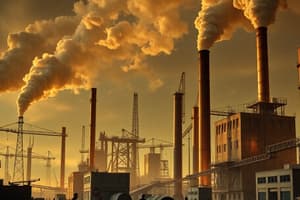Podcast
Questions and Answers
What was the income ratio between the richest 20% of the world and the poorest 60% in 1950?
What was the income ratio between the richest 20% of the world and the poorest 60% in 1950?
- 5:1
- 12:1
- 3:1
- 9:1 (correct)
What transformation did the Industrial Revolution primarily cause?
What transformation did the Industrial Revolution primarily cause?
- From traditional to digital economies
- From capitalist to socialist economies
- From machine-based to labor-intensive economies
- From agricultural to industrial economies (correct)
What are the three main questions for economic history?
What are the three main questions for economic history?
When and how did (modern) economic growth emerge? Why did Western countries grow so much faster than others? Why some countries caught up and others fell behind?
Marxist theories support the notion that labor relations do not affect economic development.
Marxist theories support the notion that labor relations do not affect economic development.
Who is associated with the idea that western rationality arose from Protestant theology?
Who is associated with the idea that western rationality arose from Protestant theology?
What was one strength of the liberal political economy after the Glorious Revolution?
What was one strength of the liberal political economy after the Glorious Revolution?
What demographic pattern did Hajnal identify in Europe?
What demographic pattern did Hajnal identify in Europe?
What does Malthus argue about income and population growth?
What does Malthus argue about income and population growth?
Human capital increases were not influenced by urbanization and commercialization.
Human capital increases were not influenced by urbanization and commercialization.
According to Allen, what was industrial technology a response to?
According to Allen, what was industrial technology a response to?
What was the primary source of pre-modern growth, according to the content?
What was the primary source of pre-modern growth, according to the content?
Who is the Scottish economist known for 'The Wealth of Nations'?
Who is the Scottish economist known for 'The Wealth of Nations'?
What is meant by economies of scale?
What is meant by economies of scale?
Flashcards are hidden until you start studying
Study Notes
Modern Economic Growth
- Significant wealth creation globally
- Disparity in growth: wealthy nations grew richer, while poorer nations stagnated
- Income ratio between richest 20% and poorest 60% widened significantly from 1820 to 1950
The Industrial Revolution
- Origin of modern economic growth
- Marked by technological advancements and a shift towards machine-based economies
- Western Europe industrialized earlier than other regions
Capitalism and Constitutional Rule
- Marxist theories: property and labor relations shape economic development
- Medieval Europe: serfdom limited labor mobility and markets
- Industrial economy required capitalist institutions like free markets and a landless working class for development
- Liberal political economy: Parliament after the Glorious Revolution enabled free markets and property rights
- Criticisms: property rights were strong in absolutist France, English state had high taxes and debt
Cultural Change
- Protestant Reformation: Weber argued for rationalism's role in Western development, but lack of empirical support
- Scientific Revolution: modern technology arose from modern science, scientific methods applied to technology were widely accepted in 18th century Europe
- Bourgeois dignity: practical professions like trade and industry gained social standing in 18th century England
Demography
- Classical economists: population growth restricted living standard growth
- Malthus: higher incomes lead to higher fertility and lower mortality, bringing living standards back to subsistence
- European Marriage Pattern (Hajnal): women married later, higher non-marriage, high fertility within marriage, few out-of-wedlock births
- Urban women's opportunities: urban jobs enabled female financial independence, delayed marriage
Economic Incentives
- Consumerism: Colonial trade and availability of goods increased demands for consumer markets, increasing work effort
- Human capital: a rise in literacy and numeracy due to urbanization and commercialization
- High wage economy: Allen argued industrial technology was created in response to high wages in Britain; high wages increased demand for innovation and human capital investment
Sources of Economic Growth
- Wealth of nations: tied to human capital and technology
- Capital and technology: key drivers of growth, particularly workforce skill
Pre-Modern Growth
- Technological progress: slow and discontinuous, derived from experience
- Capital: minimal, complementary to and owned by labor
- Sources of pre-modern growth: specialization, trade, Smithian growth
Adam Smith
- Scottish economist and philosopher (1723-1790)
- Philosopher during the Enlightenment
- The Wealth of Nations (1776)
- "Invisible hand"
- division of labor
Economies of Scale
- Gains from specialization and trade
Studying That Suits You
Use AI to generate personalized quizzes and flashcards to suit your learning preferences.




